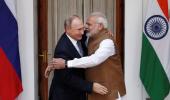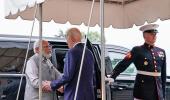EAM Jaishankar's mission is aimed at strengthening India's strategic autonomy in a complex international environment, observes Ambassador M K Bhadrakumar.

External Affairs Minister S Jaishankar's visit to Russia between December 24 and 29 presented an extraordinary spectacle reminiscent of the halcyon days of Indo-Soviet relations.
There was an unnameable ecstasy in Jaishankar's words on Russian soil.
He even took a walk in Red Square in the middle of the Russian winter.
But the minister is anything but a sentimental diplomat, who can handle emotions not necessarily as encumbrance but turning them instead into great optics.
This Russia visit will stand out in Jaishankar's diplomatic career drawing comparison alongside his stellar role in elevating the India-US relationship to a crescendo.
The paradox is Jaishankar's mission quintessentially aimed at strengthening India's strategic autonomy in a complex international environment.
An apt metaphor will be of a cruise ship caught in the storm (but not sunk) and in distress searching for a harbourage it is familiar with.
Plainly put, Jaishankar's Moscow trip aimed to create space for Indian diplomacy. The chronicle of India-Russia relationship is replete with similar situations.
The UN Security Council resolutions on a plebiscite in Kashmir, the 1956 Hungarian uprising, Prague Spring, the birth of Bangladesh, Soviet intervention in Afghanistan -- the list includes some fateful moments in modern history.
If the past two years have seen the US-Indian relationship soaring high and then nosediving shortly thereafter, the main reason is to be found in the Biden administration's growing frustration that the Modi government refused to join the West's caravan to sanction Russia, India pragmatically increased its oil imports from Russia by leaps and bounds, which became a major source of budgetary support but moderated the bite of West's 'sanctions from hell' against Russia and indirectly contributed to the phenomenal recovery of the Russian economy, which is registering currently an impressive 3.5% growth this year.
India-Russia bilateral trade has since registered a massive increase from an insipid level to touch $50 billion in 2023.
Somewhere along the line, as it happens, the headiness of success inebriated Indian decision makers as they sought to gravitate toward the Western camp for creating an even more beneficial matrix of 'cooperation'.
There is nothing wrong in pursuing a balanced policy in self-interest, but in this case, the strategy was fundamentally flawed as it was predicated also on the notion that Russia was destined to lose the war in Ukraine.
The Indian establishment drew hasty conclusions from the military setbacks suffered by Russian forces in the early phase of the Ukraine war.
The famous remark that 'this-is-not-en-era-of-wars' typified that surreal outlook.

The Americans, of course, were elated (external link) that India was showing the middle finger at Russia's 'special military operation' and word went around the global commons that India was 'distancing' from Russia.
That period of the US-Indian bromance lasted for almost an year until the middle of 2023 when Russian forces returned to the battlefield in Ukraine with a brilliant strategy of attritional war, went on to crush Kiev's 'counteroffensive,' and eventually seized the initiative as summer turned into autumn last year.
Meanwhile, three things happened. First, it was becoming apparent that the countries of the Global South were lock, stock and ditching the US and drifting toward the Russia-China axis, which, of course, put India in a quandary, as it also aspired to be the leader of the so-called Global Majority.
Second, the Western narrative on Ukraine began fraying at the edges and signs of 'war fatigue' appeared in Europe and the US.
Third, most important, the Biden administration had a profound rethink on ties with China, which were in a free fall, and from June onwards, top US officials began knocking at the door in Beijing seeking greater predictability in their relationship and pressing for a summit between President Biden and President Xi Jinping.
Suffice to say, the climate of US-China relations has improved since the summit in San Francisco in November.
But the turnaround inflicted a collateral damage on Delhi -- it diminished India's worth to Washington as 'counterweight' to China.
Curiously, the shift in the geopolitics of the Far East also happened to coincide with the current acrimony that erupted over alleged Indian plots to kill American and Canadian citizens.

Enter Russia. Sensing that the US-Indian bromance was heading south, Russia began lionising Modi.
Last month, with an eye on Washington, Putin showered fulsome praise on Modi for refusing to be 'frightened, intimidated or forced to take any actions, steps, decisions that would be at variance with the national interests of India and the Indian people.'
New Delhi expects that the US will be bogged down in its domestic politics through 2024.
With US-China tensions easing, the Indo-Pacific strategy is in the back burner and consequently, the US has no reason to fawn over India.
Nonetheless, this is not the end of the Indian-American saga. Once the next US administration settles in, there will be renewed efforts in Delhi to pick up the threads.
Make no mistake, for the Indian elites, the US remains the most consequential partner and it is guaranteed that Washington will reciprocate.
For the present, though, the fact that Russia has gained the upper hand in the war in Ukraine also means that India has no more requirement to do tight-rope walking vis-a-vis Moscow's rupture with the West.
Thus, the annual India-Russia summit is going to be resumed in 2024 after a two-year break.
India is also in a better position to push back the US criticism on human rights issues now that Washington has lost the moral high ground over Israel's war crimes in Gaza.
Overall, it is payback time for the Modi government.
Jaishankar is savouring every moment of it even after his return from Moscow.
The bottom line is that India and Russia have expanded their agenda on the templates of geopolitics and strategic interests to mutual benefit.
Going forward, beyond the optics, the efficacy and sustainability of the optics will be severely put to test at the BRICS summit in Kazan in October, which Putin will chair.

Bellwether to be watched
The big question is whether India will show the presence of mind to hit the US' core interests by going along with the creation of a BRICS currency to challenge the dollar and the US-dominated international financial and trade architecture, a project which carries Putin's imprimatur and aims at conclusively demolishing America's exceptionalism and global hegemony -- and it enjoys China's support, too.
Interestingly, the Global Times has featured an extraordinary commentary (external link) against this tumultuous geopolitical backdrop praising the Modi government sky-high for its policies. Has the time come for dusting up the Russia-India-China (RIC) format? There are no easy answers.
Equally, another bellwether to be watched is the trajectory of Russian-Indian defence cooperation, which has been historically the anchor sheet of the two countries' strategic relationship.
Take away the defence ties and India-Russia ties become an empty husk. That is why the US has been persistently demanding that India reduces its arms purchases from Russia as a mark of alignment with the West and in the spirit of deepening 'interoperability' with American weapnry.
However, at the joint press conference with Jaishankar following the talks in Moscow, Foreign Minister Sergey Lavrov dropped a bombshell. He disclosed that the discussions covered 'prospects for military-technical cooperation, including joint production of modern weapons.'
'Our interaction is strategic in this respect. Strengthening this cooperation meets the national interests of our States and helps maintain security in Eurasia,' Lavrov added. 'We have respect for our Indian colleagues' efforts to diversify ties in military-technical cooperation. We also understand and are willing to support their initiative to manufacture combat hardware under the 'Make in India' programme. We are ready to interact with them in this respect.'
The outstanding performance of Russian weaponry in the Ukraine war and the overall surge of the Russian defence industry in the past year would put Russia in a strong position to regain its footing as India's number one partner by far in military technology.
The trajectory on this front will provide conclusive evidence of a new thinking in Delhi with regard to the geopolitics of the India-Russia-US triangle.
Ambassador M K Bhadrakumar served the Indian Foreign Service for 29 years.
Feature Presentation: Aslam Hunani/Rediff.com











 © 2025
© 2025